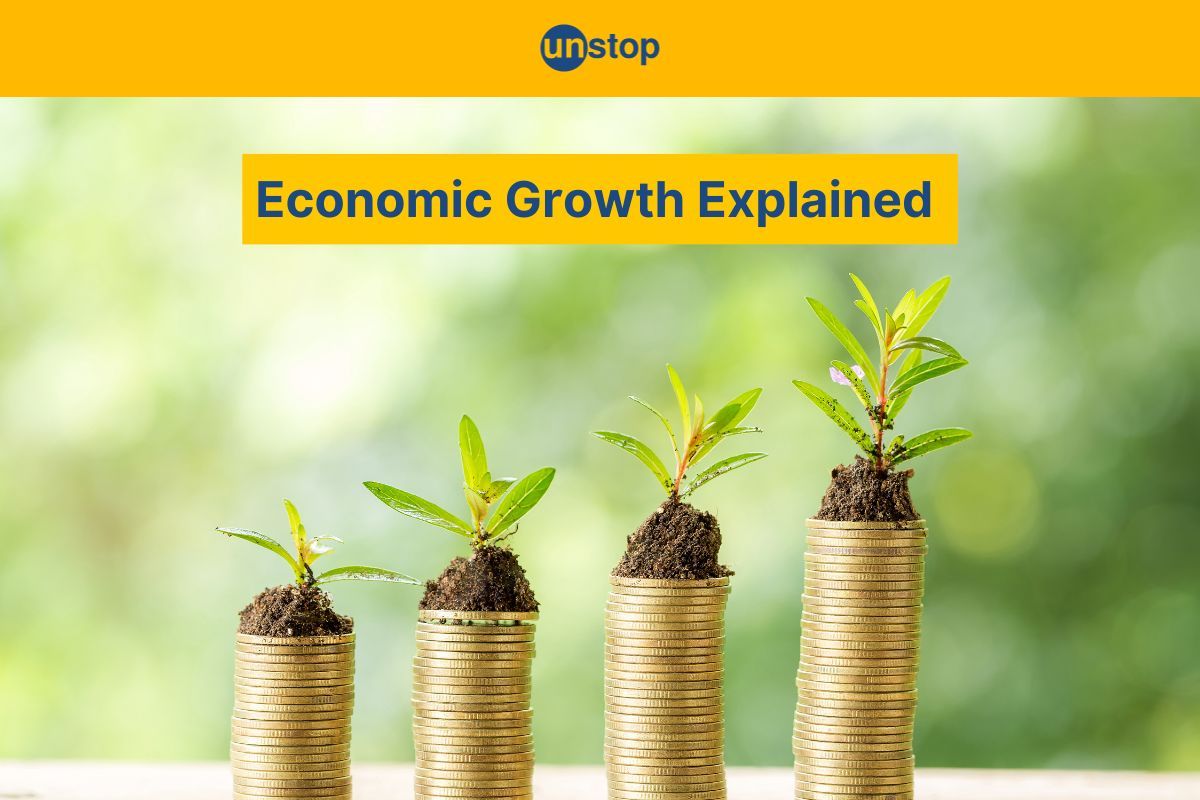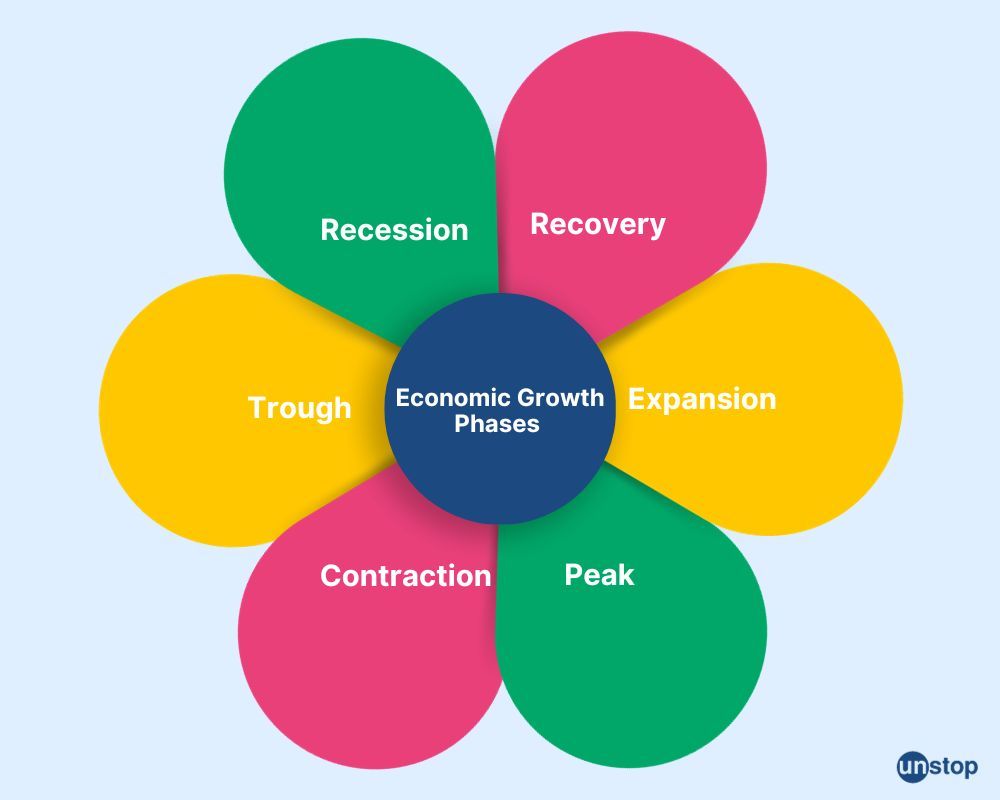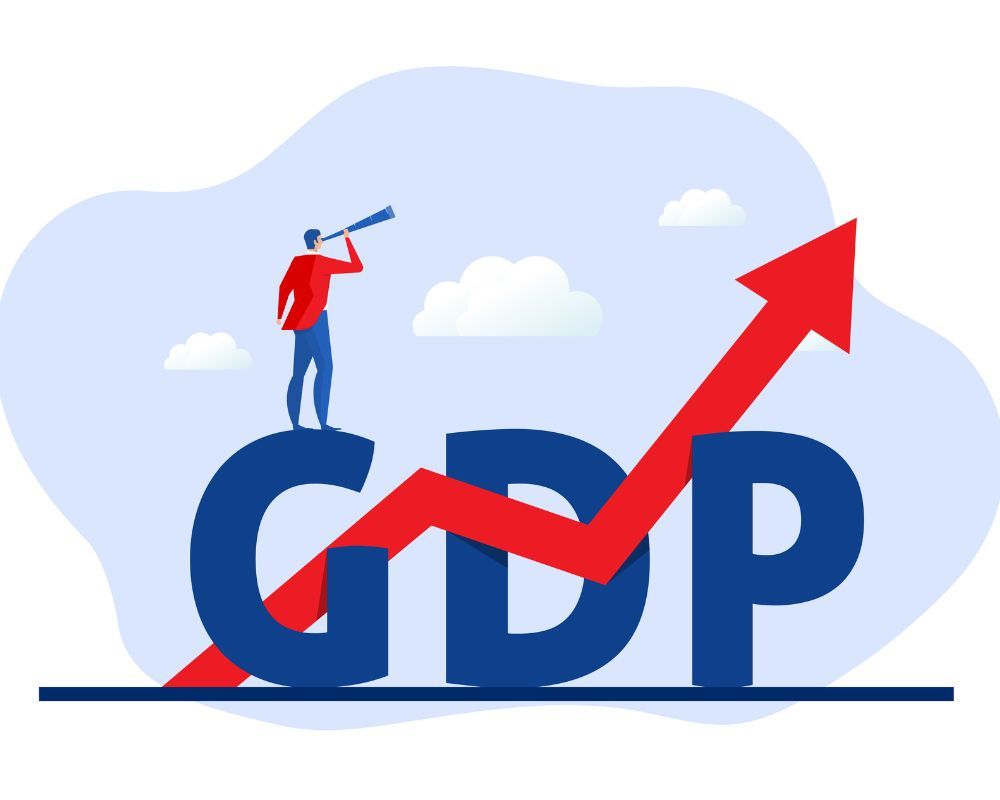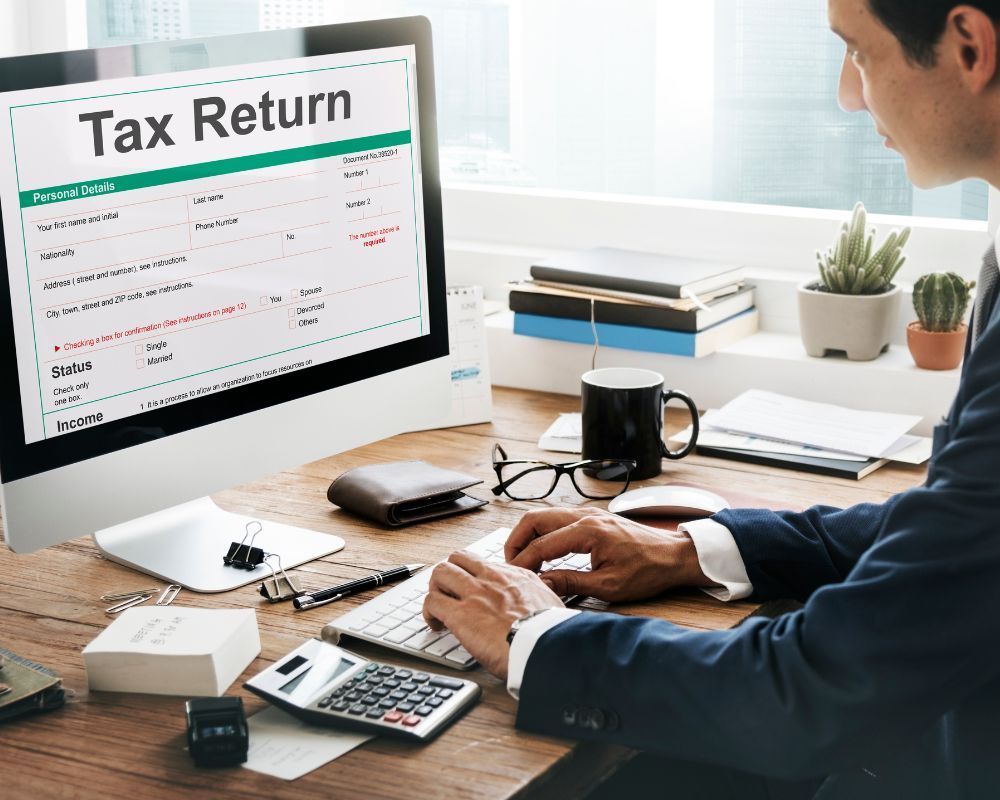- What Is Economic Growth?
- Similar Terms For Economic Growth
- Phases Of Economic Growth
- Measuring Economic Growth
- Factors Contributing To Economic Growth
- Importance Of Economic Growth
- Tax Policies & Affect On Economic Growth
- Frequently Asked Questions (FAQs)
Economic Growth: Meaning, Phases Of Growth, Factors And More!

Economic growth is a fundamental driver of progress and prosperity within an economy. It plays a pivotal role in enhancing living standards, reducing poverty, and fostering development. Policymakers and economists alike recognize the importance of the factors that contribute to economic growth. By studying the theory and history of economic growth, we can gain insights into how production, technological advancements, investment, and market forces shape the trajectory of nations.
Examples abound of early starters who harnessed the power of innovation and investment to propel their economies forward. The relationship between economic growth and improvements in quality of life is undeniable. With technology advancing at an unprecedented rate, it becomes increasingly crucial to explore how these advancements impact economic growth.
What Is Economic Growth?
Economic growth refers to the sustained expansion of an economy's productive capacity. In simpler terms, it means that an economy is consistently getting bigger and better over time. This growth is measured by various factors, such as increasing output levels, creating jobs, and raising incomes for individuals and businesses.
When we talk about economic growth, we're talking about a rise in the production and consumption of stuff within an economy. Think of it as a country leveling up its game. More factories churning out products, more people buying those products - that's economic growth in action!
Endogenous Growth Theory
Now, here comes some fancy economics lingo: endogenous growth theory. This theory suggests that economic growth doesn't just happen randomly; it can actually be influenced by things like education, technological progress, and even financial capital. In simpler terms, it means that when a country invests in education and helps its people gain knowledge and skills, it can boost economic growth. Similarly, when a country has access to financial capital (basically money that can be invested), it can fund projects and initiatives that drive economic growth.
Similar Terms For Economic Growth
In the world of economics, there are several ways to refer to economic growth. Let's explore some alternative terms that are often used interchangeably with economic growth.

Economic Expansion
One common synonym for economic growth is economic expansion. This term refers to a sustained increase in the overall economic activity of a country or region. It signifies an upward trend in various indicators, such as production, employment, and income levels. When an economy expands, it typically experiences positive changes across multiple sectors, leading to increased prosperity and opportunities for its citizens.
GDP Growth
Another term frequently used to describe economic growth is Gross Domestic Product (GDP). It is the total value of goods and services produced within a country during a specific period. When GDP experiences consistent growth over time, it indicates that the economy is expanding. Factors contributing to this include consumer spending, business investments, and government expenditures.
Output Increase
Output increase is another phrase commonly used when discussing economic growth. It refers to the rise in the quantity or volume of goods and services produced by an economy. An output increase implies greater productivity and efficiency within industries, resulting in higher levels of production overall. As a result, jobs can be created, and living standards can be improved for individuals within the economy. These alternative terms all capture different aspects of economic growth but ultimately convey the same underlying concept: a positive change in an economy's overall performance.
Economic expansion, GDP growth, and output increase are all indicative of progress and development within an economy. They signify that more goods are being produced, more people are employed, and there is generally more wealth circulating throughout society. It's important to note that economic growth isn't always uniform across all sectors or regions within a country. Some industries may experience faster expansion than others due to technological advancements or shifts in consumer demand. Economic growth can also be influenced by external factors like international trade and global economic conditions.
Phases Of Economic Growth
Economies go through different phases during their growth trajectory. These phases are essential to understand as they provide insights into the overall health and stability of an economy. By analyzing these phases, policymakers can make informed decisions to stabilize economies and promote sustainable development.

Recession
The first phase in the economic growth cycle is a recession. It occurs when there is a significant decline in economic activity, characterized by reduced production, high unemployment rates, and decreased consumer spending. During a recession, businesses struggle to stay afloat, leading to layoffs and financial difficulties for individuals.
Recovery
After a period of recession comes the recovery phase. In this stage, the economy starts to show signs of improvement. Unemployment rates begin to decrease as businesses regain stability and consumer confidence increases. The recovery phase is often marked by increased government spending on infrastructure projects and stimulus packages aimed at boosting economic growth.
Expansion
Following the recovery phase is the expansion phase. This is when the economy experiences sustained growth over an extended period. Businesses thrive during this phase, leading to increased employment opportunities and higher wages for workers. Consumer spending rises as people have more disposable income, further stimulating economic growth.
Peak
The expansion phase eventually reaches its peak when economic activity reaches its highest point before starting to decline again. At this stage, inflation may become a concern as demand outpaces supply in certain sectors of the economy.
Contraction
Once the peak is reached, the economy enters a contraction phase. During this period, economic growth slows down or even becomes negative. Businesses may start cutting back on production and laying off workers due to decreased demand for goods and services.
Trough
The trough represents the lowest point in an economic cycle where output levels are at their lowest before starting to recover again. Unemployment rates tend to be high during this phase as businesses struggle with reduced demand.
Understanding The Phases Of Economic Growth
Understanding these phases of economic growth is vital for policymakers. By monitoring the business cycle and identifying which phase an economy is in, policymakers can implement appropriate measures to stabilize and stimulate economic growth. During a recession, policymakers may focus on implementing expansionary fiscal policies such as reducing taxes or increasing government spending. These measures aim to boost consumer spending and stimulate demand.
In contrast, during an expansion phase, policymakers may adopt contractionary monetary policies to prevent inflation from spiraling out of control. This can involve increasing interest rates or reducing the money supply to cool down an overheating economy. By recognizing the different phases of economic growth, policymakers can make informed decisions that promote stability and sustainable development. They can anticipate potential challenges and take proactive steps to mitigate their impact on the overall economy.
Measuring Economic Growth
To understand how an economy is performing, it's crucial to measure its economic growth. One commonly used indicator for this purpose is the Gross Domestic Product (GDP). Basically, it measures how much goods and services are produced within a country's borders.
GDP As A Measure Of Economic Growth
GDP serves as a primary metric for measuring economic growth due to its comprehensive nature. It offers a snapshot of an economy's size and activity level. It encompasses various sectors such as agriculture, manufacturing, and services. Using GDP allows governments to track progress over time and make comparisons with other countries. It enables policymakers to evaluate the effectiveness of their economic strategies and identify areas that require improvement or investment.

Image credit: Freepik
GDP helps in understanding income distribution and living standards within a nation. However, while GDP is widely used, it has certain limitations. For instance, nominal GDP does not account for inflation or changes in price levels over time. Therefore, economists often adjust GDP figures using real GDP to account for inflationary effects accurately.
Alternative Indicators
In addition to GDP, there are alternative indicators that can provide further insights into economic performance. One such indicator is Gross National Product (GNP), which measures the total income earned by residents of a country—both domestically and abroad—regardless of where they are located physically. Another useful measure is Net National Income (NNI), which takes into account depreciation or wear-and-tear on capital assets like buildings and machinery. NNI provides a more accurate representation of an economy's income after accounting for capital consumption.
These alternative indicators offer different perspectives on economic growth and complement each other when analyzing an economy comprehensively. They help policymakers gain deeper insights into factors such as international trade dynamics or changes in national income due to overseas investments.
Factors Contributing To Economic Growth
Several factors contribute to economic growth. Let us study some of the factors listed below:
Technological Advancements
Technological advancements play a prominent role in driving economic progress. When new technologies are developed and adopted, they accelerate productivity and efficiency in various industries to a great extent. For example, the invention of the internet revolutionized communication and created new opportunities for businesses around the world.
Population Growth
Population growth also plays a significant role in economic growth. As the population increases, so does the potential consumer base for goods and services. This can stimulate demand and drive economic activity. A growing population means more people available to work and contribute to the economy.
Power Of Household Spending
When individuals like you and me go out and buy stuff, we're actually contributing to economic growth. Our purchases create demand for goods and services, which in turn encourages businesses to produce more. So, never underestimate the power of your pocket money!
Investment In Infrastructure
Policies promoting investment in infrastructure can stimulate economic growth by attracting businesses and fostering development. By allocating funds toward building roads, bridges, and other public facilities, governments create an environment that is conducive to business expansion. This leads to increased job opportunities and higher productivity levels, ultimately driving economic growth.
Encouraging Entrepreneurship
Encouraging entrepreneurship through supportive regulations can also play a crucial role in generating economic growth. When governments implement policies that reduce barriers to entry for new businesses, it creates a favorable ecosystem for entrepreneurs to thrive. This not only leads to job creation but also fosters innovation-driven growth. Startups and small businesses often introduce disruptive ideas and technologies into the market, which can have a significant impact on overall economic development.
Education & Skills Development
Investing in education and skills development is another key factor in fueling long-term economic growth. By enhancing human capital formation, nations equip their workforce with the knowledge and expertise required to adapt to changing market dynamics. A well-educated population is more likely to attract investments from multinational corporations seeking skilled labor. A skilled workforce increases productivity levels, leading to higher output per worker and overall economic prosperity.
Availability Of Natural Resources
The availability of resources is another important factor in economic growth. Natural resources like oil, minerals, and agricultural land can fuel economic development by providing raw materials for industries or generating export revenue. However, it's worth noting that sustainable resource management is essential to ensure long-term economic growth without depleting valuable resources. Therefore, diversifying the economy by investing in sectors beyond natural resources is essential for sustainable long-term growth.
Importance Of Economic Growth
Economic growth has numerous benefits for individuals, businesses, and society as a whole:
- Job Creation: Economic growth leads to increased employment opportunities as businesses expand their operations or new ventures emerge.
- Higher Incomes: With economic growth comes rising incomes for workers due to increased demand for labor.
- Improved Standard of Living: As incomes rise, consumers have sufficient and more disposable income to spend on goods and services, leading to an improved standard of living.
- Poverty Reduction: Economic growth can help reduce poverty rates by providing job opportunities and lifting people out of low-income situations.
- Increased Tax Revenue: A growing economy generates higher tax revenues that can be used to invest in public services, infrastructure, and social programs.
- Innovation & Technological Progress: Economic growth often fosters innovation and technological advancements, driving further progress in various sectors.
- Global Competitiveness: A strong economy enhances a country's competitiveness on the global stage, attracting investments and promoting trade.
While economic growth is generally seen as positive, it's important to ensure that it is sustainable and inclusive. Sustainable growth considers environmental factors and aims to minimize negative impacts on ecosystems. Inclusive growth focuses on reducing income inequality, making sure that the benefits of economic growth are shared by all segments of society.
Tax Policies & Affect On Economic Growth
Tax policies play a crucial role in influencing economic growth. The way taxes are structured can either stimulate or hinder investment and consumption, which in turn impacts the overall economy.

Image credit: Freepik
High Tax Rates Discourage Expansion & Investment
High tax rates have the potential to discourage businesses from expanding their operations or individuals from making investments. When taxes are excessively high, it reduces the amount of money available for businesses and individuals to spend on other productive activities. As a result, economic growth may slow down.
Well-Designed Tax Systems Promote Sustainable Growth
On the other hand, well-designed tax systems that promote fairness and efficiency can support sustainable economic growth. By implementing appropriate tax policies, governments can create a viable environment that encourages businesses to invest and individuals to save and spend.
-
Stimulating business investment: Lowering corporate taxes can incentivize companies to start investing in new projects, expand their workforce, and develop innovative products or services. This increased investment has a positive impact on economic growth by creating job opportunities and driving productivity.
- Encouraging consumer spending: Tax cuts for individuals can put more money in people's pockets, boosting consumer spending. When consumers have more disposable income, they are willing to purchase goods and services, which stimulates demand and contributes to economic expansion.
- Attracting foreign direct investment (FDI): Favorable tax regimes can attract foreign investors looking for opportunities abroad. Countries with competitive tax rates may lure multinational corporations seeking to establish operations or expand their presence internationally. This influx of FDI brings capital inflows into the country, leading to job creation and technological advancements.
- Supporting small businesses: Implementing lower tax rates specifically tailored for small businesses can provide them with financial relief. Small enterprises often face challenges due to limited resources; reducing their tax burden allows them to reinvest profits back into their ventures. This promotes entrepreneurship, innovation, and job creation, contributing to overall economic growth.
- Balancing tax revenue and economic growth: It is important to strike a balance between tax rates and revenue generation. While lower taxes can stimulate economic activity, they should not compromise the government's ability to fund public services and infrastructure development. Finding the optimal tax rate that maximizes both economic growth and revenue collection is crucial for sustainable fiscal policy.
Difference Between Economic Growth & Economic Development
Economic growth and economic development are two distinct concepts. While economic growth refers to an increase in the production of goods and services within a country, economic development encompasses broader aspects such as improving living standards, reducing poverty, and promoting social welfare. Understanding the difference between these two terms is crucial in formulating effective policies and strategies for sustainable economic progress.
|
Economic Growth |
Economic Development |
|
It indicates an increase in the production and consumption of goods and services |
Improvement in the quality of life and well-being of individuals |
|
Focuses on the quantitative aspects of an economy |
Emphasizes the qualitative aspects of an economy |
|
Measured by indicators such as GDP, GNP, and per capita income |
Measured by indicators such as Human Development Index (HDI), literacy rate, and life expectancy |
|
It does not necessarily lead to equitable distribution of wealth |
Aims for equitable distribution of wealth and resources |
|
Can be achieved through factors like technological advancements and increased productivity |
Requires a comprehensive approach including education, healthcare, infrastructure development, and social welfare |
|
Can result in environmental degradation and depletion of natural resources |
Strives for sustainable development and environmental conservation |
|
Can be influenced by short-term economic policies and fluctuations |
Requires long-term planning and sustainable policies |
|
Focuses more on the economic aspect of a nation's progress |
Apart from the economic aspect, it considers social, cultural, and environmental factors |
Conclusion
In conclusion, economic growth is an important aspect of any thriving economy. It refers to the increase in the production and consumption of goods and services over time. Economic growth goes through various phases, including expansion, peak, recession, and recovery. Measuring economic growth involves analyzing indicators such as GDP, employment rates, and productivity levels. Generating economic growth requires a combination of factors such as investment in infrastructure, technological advancements, education and skills development, and favorable government policies.
The importance of economic growth cannot be overstated. It leads to higher standards of living for individuals by creating job opportunities and increasing incomes. It allows governments to invest in public services like healthcare and education. Also, striking a balance between tax revenue generation and promoting business expansion is crucial for sustained economic growth.
Let's put your learnings to the test!
Frequently Asked Questions (FAQs)
Q1. What is economic growth, and why is it important?
Economic growth is the increase in a country's production of goods and services over time. It's crucial because it leads to improved living standards, job creation, and overall prosperity. By boosting the economy, economic growth allows governments to invest in public services, infrastructure development, and social programs.
Q2. How is economic growth measured?
Economists measure economic growth using the Gross Domestic Product (GDP) indicator. GDP calculates the total value of all goods and services produced within a country's border during a specific period. It provides an overview of the country's economic performance, allowing policymakers to gauge progress and make informed decisions.
Q3. What are the main drivers of economic growth?
Several factors contribute to economic growth. Investments in physical capital, such as infrastructure, machinery, and technology, play a significant role. Human capital development through education and healthcare also fuels growth by enhancing productivity. Innovation, entrepreneurship, trade openness, a stable political environment, and supportive government policies stimulate economic expansion.
Q4. Can economic growth solve all societal problems?
While economic growth brings numerous benefits, it alone cannot address all societal issues. It can reduce poverty rates and improve living conditions but may not eliminate inequality entirely. Other challenges like environmental sustainability or social cohesion require targeted policies beyond mere economic expansion. Therefore, a comprehensive approach that combines sustainable development goals with inclusive policies is essential for addressing various societal concerns.
Q5. How can individuals contribute to promoting economic growth?
Individuals can actively participate in promoting economic growth by engaging in entrepreneurial activities or seeking opportunities for skill development through education or vocational training programs. Supporting local businesses by purchasing their products/services can also stimulate regional economies. Moreover, being informed about government policies and participating in civic activities helps shape favorable conditions for sustained economic progress.
Suggested reads:
Instinctively, I fall for nature, music, humor, reading, writing, listening, traveling, observing, learning, unlearning, friendship, exercise, etc., all these from the cradle to the grave- that's ME! It's my irrefutable belief in the uniqueness of all. I'll vehemently defend your right to be your best while I expect the same from you!
Login to continue reading
And access exclusive content, personalized recommendations, and career-boosting opportunities.
Subscribe
to our newsletter













Comments
Add comment